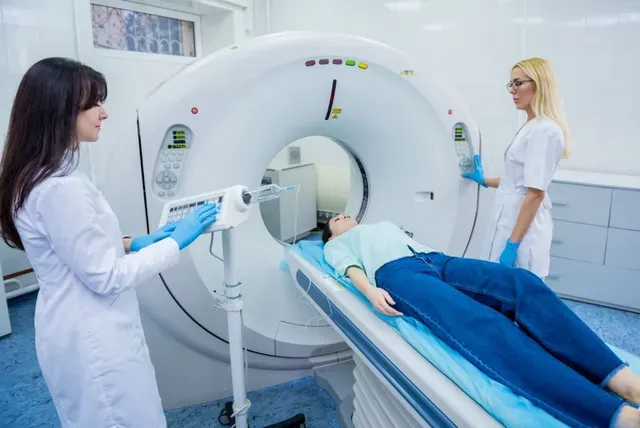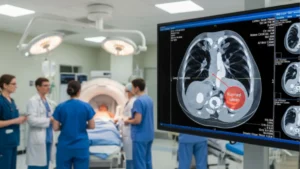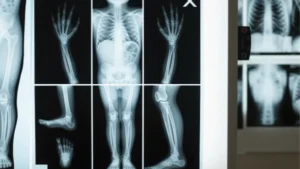A computed tomography (CT) scan is a type of medical imaging method that creates a 3D image of your body. It does this by aiming a narrow beam of x-rays at the body.
What Is A CT Scan?
A computed tomography (CT) scan is a type of medical imaging method that creates a 3D image of your body.
It does this by aiming a narrow beam of x-rays at the body. This beam is then quickly rotated around the body, making a single image “slice”. This is then repeated down the body, and the slices are digitally stacked to form a 3D image.
The benefit of a CT scan is that it provides more information than a typical x-ray would, since it is a three-dimensional image.
Depending on the information your doctor hopes to obtain from the CT scan, you may have to have a scan with a contrast agent. This means that before your CT scan, you will get a contrast agent that you will either drink or have injected into you, depending on the purpose of the scan. This contrast agent shows up clearly on the CT scan, allowing a doctor to see how specific systems in the body are working, such as the digestive or circulatory system.
Who Needs A CT Scan?
CT scans help identify many different diseases or injuries because of the detailed images they provide. Some of these include:
- Tumors
- Heart disease or abnormalities
- Blood clots
- Hemorrhaging
- Pulmonary embolisms
- Excess fluid in the lungs
- Pneumonia
- Complex bone fractures
Preparing For Your CT Scan
When you are getting a CT scan, you will want to wear comfortable and loose-fitting clothing. However, in some instances, you may be provided a hospital gown to wear during the scan.
Some individuals may be asked to refrain from eating or drinking for a few hours before the exam. This is especially likely if you are having a contrast scan. Be sure to follow all instructions provided before the CT scan.
In most cases, your CT scan will be complete in about 30 minutes, and they are usually painless and easy; you just need to lie still.
CT Scan Risks
There are some risks associated with CT scans that are important to be aware of.
As with all x-ray procedures, CT scans produce ionizing radiation that may cause biological effects in the tissues of your body. The more often someone is exposed to this radiation, such as through multiple scans, the more the risk of biological effects. Still, the risk of developing cancer from radiation exposure is minimal.
It is also vital that anyone who may be pregnant inform their doctor or image technician before the procedure. As long as the area being imaged is not the abdomen or pelvis, there is no known risk to the baby. However, if that area does need to be imaged, doctors typically prefer to use methods that do not require radiation, such as an ultrasound or MRI.
For those getting a contrast scan, there is a possibility of an allergic reaction. It is also not recommended for IV contrast agents to be used in those with abnormal kidney function because they may cause further damage to the kidneys.
In most cases, the benefits of a CT scan in terms of diagnosis and treatment assistance far outweigh these potential complications, especially since, in some cases, a CT scan provides life-saving information.
If you need to schedule a CT scan, the team at One Step Diagnostic can help you create an appointment and can answer any additional questions you may have.



